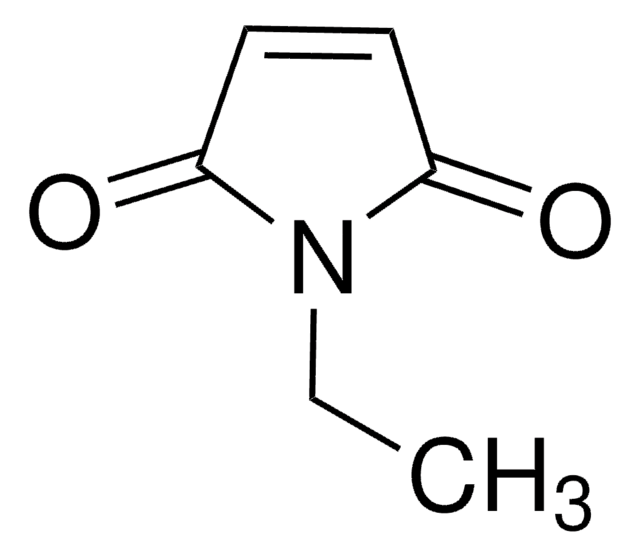63689
2-Mercaptoethanol
BioUltra, for molecular biology, ≥99.0% (GC)
Synonym(s):
β-Mercaptoethanol, 2-Hydroxyethylmercaptan, BME, Thioethylene glycol
About This Item
Recommended Products
grade
for molecular biology
Quality Level
vapor density
2.69 (vs air)
vapor pressure
1 mmHg ( 20 °C)
product line
BioUltra
Assay
≥99.0% (GC)
form
liquid
expl. lim.
18 %
reaction suitability
reagent type: reductant
concentration
14.3 M (pure liquid)
technique(s)
RNA extraction: suitable
protein extraction: suitable
impurities
DNases, none detected
RNases, none detected
insoluble matter, passes filter test
phosphatases, none detected
proteases, none detected
refractive index
n20/D 1.500 (lit.)
n20/D 1.501
pH
4.5-6 (20 °C, 500 g/L)
bp
157 °C (lit.)
solubility
H2O: 0.5 M at 20 °C, clear, colorless
density
1.114 g/mL at 25 °C (lit.)
cation traces
Al: ≤0.5 mg/kg
Ba: ≤0.1 mg/kg
Bi: ≤0.1 mg/kg
Ca: ≤0.5 mg/kg
Cd: ≤0.05 mg/kg
Co: ≤0.02 mg/kg
Cr: ≤0.02 mg/kg
Cu: ≤0.02 mg/kg
Fe: ≤0.1 mg/kg
K: ≤0.5 mg/kg
Li: ≤0.1 mg/kg
Mg: ≤0.1 mg/kg
Mn: ≤0.02 mg/kg
Mo: ≤0.1 mg/kg
Na: ≤1 mg/kg
Ni: ≤0.05 mg/kg
Pb: ≤0.1 mg/kg
Sr: ≤0.1 mg/kg
Zn: ≤0.1 mg/kg
SMILES string
OCCS
λ
0.5 M in H2O
UV absorption
λ: 260 nm Amax: 1.5
λ: 280 nm Amax: 0.3
storage temp.
2-8°C
InChI
1S/C2H6OS/c3-1-2-4/h3-4H,1-2H2
InChI key
DGVVWUTYPXICAM-UHFFFAOYSA-N
Looking for similar products? Visit Product Comparison Guide
Application
- in the protein extraction buffer prepared for leaf samples.
- as a supplement in cell culture media.
- in the procedure of RNA extraction.
Other Notes
Signal Word
Danger
Hazard Statements
Precautionary Statements
Hazard Classifications
Acute Tox. 2 Dermal - Acute Tox. 3 Inhalation - Acute Tox. 3 Oral - Aquatic Acute 1 - Aquatic Chronic 2 - Eye Dam. 1 - Repr. 2 - Skin Irrit. 2 - Skin Sens. 1A - STOT RE 2 Oral
Target Organs
Liver,Heart
Storage Class Code
6.1A - Combustible acute toxic Cat. 1 and 2 / very toxic hazardous materials
WGK
WGK 3
Flash Point(F)
165.2 °F - closed cup
Flash Point(C)
74 °C - closed cup
Personal Protective Equipment
Certificates of Analysis (COA)
Search for Certificates of Analysis (COA) by entering the products Lot/Batch Number. Lot and Batch Numbers can be found on a product’s label following the words ‘Lot’ or ‘Batch’.
Already Own This Product?
Find documentation for the products that you have recently purchased in the Document Library.
Articles
Bis-Tris gels and buffers for superior protein resolution compared to traditional tris-glycine gels.
Our team of scientists has experience in all areas of research including Life Science, Material Science, Chemical Synthesis, Chromatography, Analytical and many others.
Contact Technical Service








